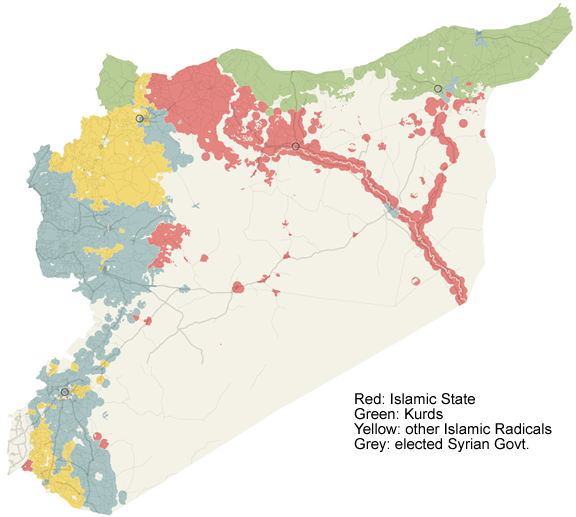What is Art, and what excuses its destruction?
Art gets trashed every day, and has throughout history. Artists often trash some of their own work as "not good enough." Some parents save their children's art, some throw it out.Generally, if art starts having a cash value, it tends to get saved. If it does not have value, it gets trashed when it becomes inconvenient.
Old art, good and bad, tends to get valued, to be seen as "collectable," simply because it is old. Almost anything over 200 years old is of antiquarian interest, even if it was not very good art to begin with.
Some art gets trashed because some people find it objectionable.This raises the question: who gets to decide what art is objectionable?
Recently the Islamic State and other radical Islamic groups have been accused of destroying art, including ancient artifacts. For instance, it has been reported that soldiers of the Islamic State recently destroyed some of the ancient remains at Palmyra.
It is pretty easy for Americans to look down our noses at the citizens of the Islamic State for their lack of appreciation of the art of ancient civilizations. But America has a pretty bad record when it comes to destroying art. We just don't think about it, because we are trained to have a Nationalist attitude.
For instance, there was that statue of Saddam Hussein that American troops famously destroyed during the Second Iraq War. Pretty much all statues are art. Is it okay to destroy a statue of a person you don't like?
If it is okay to destroy a statue of Saddam Hussein, who gets to decide what gets preserved as Art and what gets destroyed as Statues of Hated People?
When Christians took over the Roman Empire they destroyed a lot of Art because it represented gods other than Jesus and "God the Father." Some statues were preserved by repurposing them as Christian saints. How is Islamic destruction of what they perceive to be false gods different from the favorite Christian pastime of smashing idols?
How much art was vaporized with Hiroshima and Nagasaki, or burned with Tokyo and dozens of other German and Japanese cities that were firebombed during World War II? Is it okay to destroy art if it is just collateral damage to the destruction of enemy populations? [It should be noted that Franklin Delano Roosevelt, or his advisors, did not allow Kyoto to be firebombed, because of its artistic and historic significance. But he okay'd all the other destruction, until he died and Harry Truman did the final okays.]
Now that I have desensitized you a bit, be prepared for a shock. There is a movement to destroy a lot of important, historic art right now in America.
This movement is not being done by Christian yahoos or right-wing thugs. It is being promoted by people who would style themselves leftist, progressive, or liberal (which is how I typically would style myself, except when I think leftists and progressives are acting like idiots, which is surprisingly often).
This movement wants to destroy art that depicts leaders of the Confederate States of America.
It is easy to understand the feelings of this particular group of would be art destroyers. The Confederate States of America was a complex phenomena, but central to that nation were the institution of slavery, and specifically a slavery based on "race," or skin color. Not only were slaves badly treated, but for about 100 years after the Confederacy was defeated in battle, descendants of slaves were denied civil rights (and economic rights) by the Democratic Party in the states that had been in the Confederacy.
If the display of a statue makes people feel bad (for whatever reason), should the statue be destroyed?
How precious is art, really? If we can throw away an old painting we don't like (by an artist who did not become famous), or a child's classroom work, can we throw away any art for any reason? For a good reason like not reminding them of slavery?
If so, there should be no problem with the Taliban or the Islamic State throwing away art, no matter how ancient. Nor should it be a problem to melt down statues of Confederate generals.
I favor preserving art, especially if it has become historic. I don't like Christianity or Islam, but I would not destroy the art of these groups.
I would not destroy a statue of Harry Truman, even though he is the only national leader in history to use atomic weapons against cities of civilians.
If we collectively decided to destroy statues of Confederate generals, should we not also destroy the statues of other slave owners, including Presidents? Should we not destroy the Jefferson Memorial and Washington Monument? Most of the Presidents before Lincoln were slave owners. That is a lot of art and history destruction to put on the agenda. And what about Indian-killer statues?
I think there are two things that are appropriate to do about Confederate statues and other artistic artifacts. One is to put up new plaques beside the statues, pointing out our present view that these were bad men who defended a rotten social system. We should not forget history. We should particularly remember the mistakes of the past, in the hope that those mistakes are not repeated.
The other option is to let governments make a little money, and let the free market decide what is worth keeping. Auction off the statues. If a museum or private collector is the high bidder, fine. If a materials recycler, or someone else who wants to destroy art, is the high bidder, that is fine too. Not all art deserves to survive forever.

